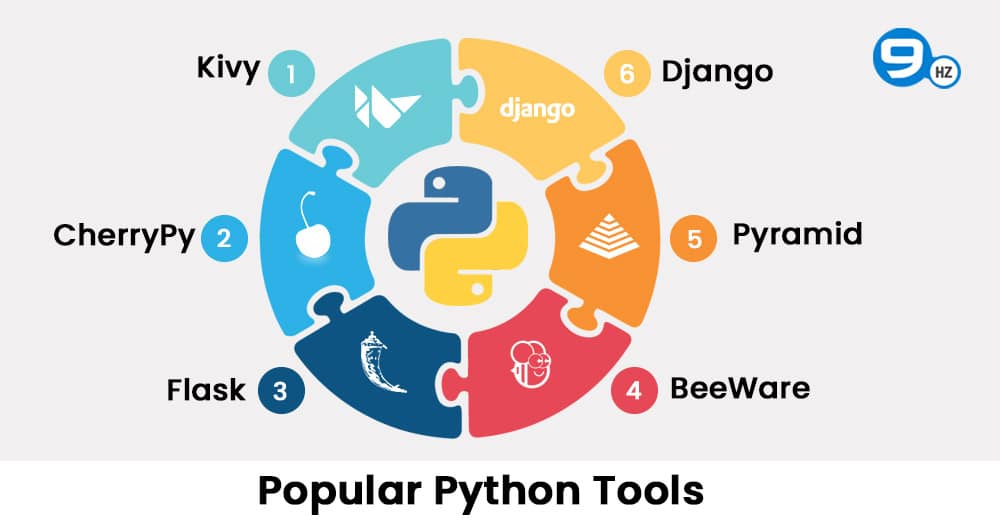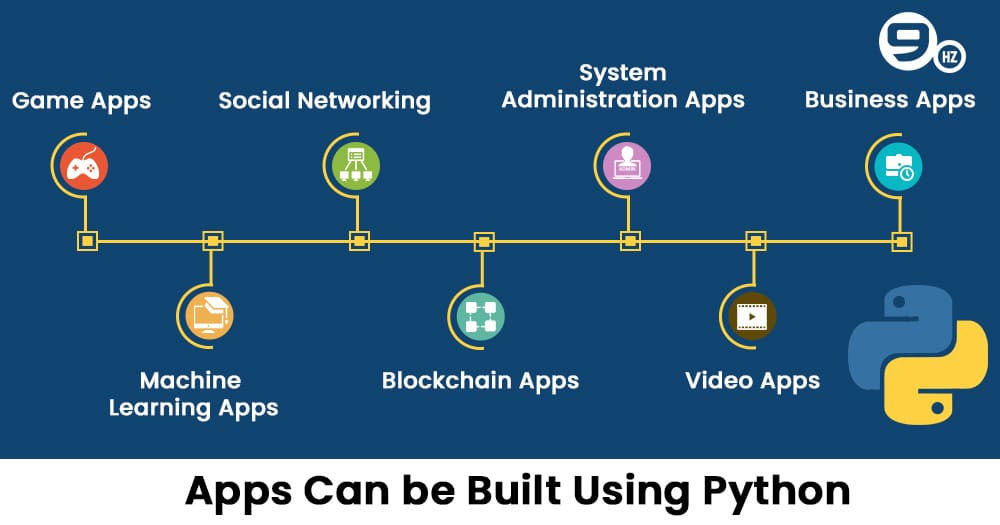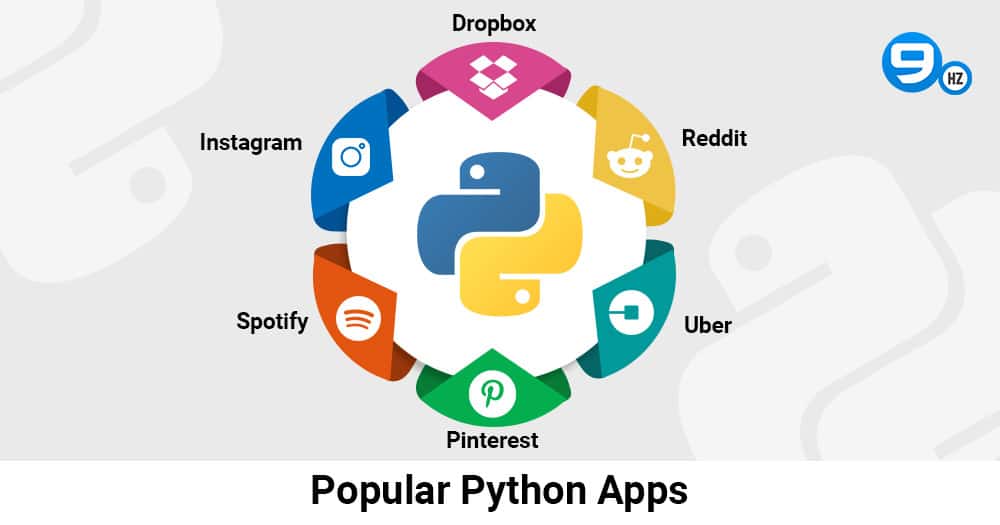Python App Development | Technology is evolving at a rapid pace. Therefore smartphones, Artificial Intelligence, Smartphones, and other devices will gradually improve. Then, in order to put these technologies to use, we developed a range of tools and mobile apps that are worked by programming languages. Python language is one such widely-used programming language among other languages.
Python is a common programming language among top python developers. It was ranked as the best programming language of 2019, knocking out Java’s original coding language. It has greatly eased the entire mobile app development services and received the aforementioned title.
So, let’s dive in to know everything about Python mobile App Development, popular python tools for app making, diff between Python vs. Java, and so on!!!
Why Python language for Mobile App Development?
It is open-source, one of the popular general-purpose programming languages used to create mobile applications for various mobile platforms. Python app development is simple to learn and comprehend and new code can be written rapidly. It works well with large amounts of data and may be used with other languages.
Python, which was created 30 years ago by Guido van Rossum, has only grown in popularity and continues to expand at a remarkable rate. Because of its enormous popularity, the language comes with a plethora of dependable libraries and frameworks. It’s no wonder that adequate tools for developing android and ios apps are among them a large community has already fixed and dock hundreds of issues on sites like Stack Overflow, Discord, and Slack. There are many developers who can create mobile applications in Python ecosystem, making it easy to identify specialists or excellent personnel.
Python also provides libraries and popular frameworks that allow you to write code once and run it on several mobile platforms (i.e., Android, iOS). This is known as cross-platform development.
Cross-platform programming is a significant advantage for python mobile development. Traditionally, in order to produce android and ios apps, developers had to work on two totally distinct app versions based on different programming languages at the same time. Today, Kivy and BeeWare framework allows developers to simply turn a single piece of code into versions that function on iOS, Android, or any other platform of their choice, without having to write different mobile and desktop apps one by one.
Popular python Frameworks For Python mobile Development
Let’s check out the top python frameworks that you can use for Python application development.
1. Django
Django, a high-level, open-source web framework in Python programming language, encourages rapid mobile app development and pragmatic, clear design. It is also used for backend programming like other programming languages. Django is designed to let users swiftly move programs from concept to completion. Furthermore, this tool prioritizes security and assists, developers, in avoiding numerous frequent security blunders.
Django Key Features
- Allows for the creation of mobile and web apps with minimal code.
- Its documentation is superior to those of competing tools.
- secure and safe
2. Pyramid: Python Mobile App Framework
It is a small and fast web development framework for Python 2 and 3, designed to help you create online programs rapidly. Furthermore, it just provides the essential technologies necessary for nearly all online applications: code URL mapping, static asset serving, and security. Pyramid also encourages standard cross platform python framework techniques with virtual environments, packaging tools, logging, and different features.
Pyramid Key Features
- Allows for the creation of URLs in order to allow for updates.
- URLs to static resources are generated.
- Routes and traversal are supported.
3. BeeWare: Python Mobile Apps Framework
BeeWare is a set of libraries and tools used for creating and delivering native Python programs. The library and toolset work together to let a developer create cross-platform native GUI port Python applications. BeeWare also includes the Toga GUI toolkit, which is OS native, Python native apps, and cross platform UI applications. Rubicon Java is also a Python library for interacting with Java libraries.
A Briefcase is a tool for packaging Python programs into distributable artifacts that can be shipped to end-users. Furthermore, pre-compiled Python binaries are utilized on systems where official Python installers are not available. Rubicon ObjC is a Python-based library tool for working with Objective C libraries on macOS and iOS.

BeeWare Key Features
- The same codebase is used for various platforms.
- BeeWare offers specific tools like Toga and Briefcase.
- It takes advantage of the native user interfaces.
- Kivy and BeeWare are cross-platform tools that aid in the mobile app development of iOS and Android applications.
Certified Python App Developers[Hire in 1 Hr]
Request A Free Quote
4. CherryPy
CherryPy is an open-source framework that can embed its multi-strung server. There is a huge popularity of this framework. It has features such as a setup framework, a thread-pooled web server, and a module framework.
The framework does not require you to utilize any specific ORM or template engine. It enables developers to use a variety of data access and templating tools. As a result, building ios and android app in Python for mobile devices has become a popular choice among developers.
Key Features of CherryPy
- It’s simple to operate several HTTP servers.
- A robust configuration system
- provides a versatile plugin system
- Profiling, coverage, and testing are all built-in.
5. Kivy
It is an open-source Python programming language software development library for rapid app creation that employs innovative UI, such as multi-touch applications. It is GPU-accelerated, cross-platform, and suitable for corporate use. This framework is dependent on a number of Python libraries, including PIL, GStreamer, Cairo, and others.
Kivy Key Features
- Code that is more understandable and has shorter syntaxes
- Widget creation is simple.
- Allows for multi-touch user controls
- It includes a custom-built user’s native applications ui toolkit.
- Python library and GUI framework that is open source
6. Flask
This Python framework is known as a microframework and is built on Werkzeug and Jinja 2. Flask, unlike other frameworks, does not require tools and libraries due to built-in support for unit testing, restful request dispatching, and so on. Flask is seen to be a better choice for small projects than Django, which is used for large projects.
Key Features of Flask
- A built-in faster development server and a quick debugger.
- Support for unit testing is built-in.
- A lightweight and modular design let you use a versatile web framework.
Also Read: 10+ Top Javascript Frameworks
Popular Tools for Python Mobile Apps Development
Now, we are aware of the many python mobile app framework used for python mobile apps development but not sure how to develop a python app. Let’s look at some of the major Python Tools For mobile application Development that may help you build a mobile app in Python.
1. Python-for-Android
It is an open-source utility that was developed for the Kivy framework. Python-for-Android studio enables the packaging of Python code as an independent, standalone Android APK that can then be transferred, installed, or even posted to mobile market like Play Store or apple store.
2. PyJNIus
PyJNIus, formerly known as JNIus, is a Python library for accessing Java classes via the JNI, or Java Native Interface.
3. PyOBJus
PyJNIus accesses Java classes, whereas PyOBJus accesses Objective-C classes. The auto class method in PyOBJus is the highlight since it loads the Objective-C classes into PyObjus, which then wraps these objects in Python programming language.
4. Plyer
Many mobile applications that we use on a daily basis require access to native mobile functions such as camera, flash, GPS, and so on. Plyer is a platform-independent API that takes advantage of certain Python programming language capabilities. The external library called by Plyer will change depending on the particular platform on which it is executed.
So far, we’ve discussed Python For Mobile App Development and its frameworks. Let’s have a glance at a few of the apps (use cases) that may be implemented by utilizing Python from scratch.
What Kind of Apps Can be Built Using Python programming language?

Python For Mobile App Development can be used to create a variety of applications. Let’s have a look at some examples:
1. Audio and Video Apps
Python mobile Application Development enables you to develop music and other audio and video applications. Apps Built Using Python may be used to analyze audio and video content on the Internet, which is abundant. Python packages such as PyDub and OpenCV can assist you in completing the app making successfully.
Python is used to construct some applications, such as YouTube. You can see how handy and amazing this language is for creating high-performance apps.
2. Blockchain Applications
Blockchain, one of the most popular technologies of python development, is currently ruling the industry. Blockchain development can be difficult for developers, but Python can help. It’s simple like other languages that make the process of developing blockchain business apps a breeze.
Developers are capable of interacting with the blockchain via HTTP requests over the Internet. Furthermore, they provide endpoints for various blockchain functions using Python frameworks such as Flask. With the help of Python, developers may now run scripts on multiple PCs to create a decentralized network.
3. Machine Learning Apps
Machine Learning development is another technology trend that has emerged in the last decade. It is a type of algorithm technology that feeds data to operating systems, allowing them to make intelligent judgments. Creating machine learning programs used to be a difficult effort, but Python has made it much easier.
Python includes machine learning libraries such as Scikit and Pandas that are freely available on the market and can be used under a GNU license.
NLP (Natural Language Processing) is one branch of machine learning that allows a system to analyze, comprehend, and manipulate human language in order for the algorithm to function. With only a rudimentary understanding of Python, developers may design machine learning apps using these extraordinarily competent and helpful tools.
4. Business Apps
Python is exceptionally agile, and as a result, it is capable of developing a wide range of mobile applications. It can help you create mobile apps that automate complex company procedures and activities, which is why python should use it to developing mobile apps. Python is an excellent alternative for designing apps that will increase your company’s productivity.
Aside from that, because Odoo can be used for Python mobile apps development, creating ERP and E-commerce solutions becomes more accessible. It is a Python-based all-in-one management program. It assists you with a variety of business management applications.
Also Read: Install Python Pandas on windows
5. System Administration Apps
System administration can be time-consuming due to the hundreds of jobs that must be completed and the large amount of data that must be managed. System administration applications are a lifesaver for management in this situation.
Python is ideal for creating system administration apps because it allows developers to interface with the operating system using the ‘os’ module. It also makes it simple for app developers to interact with the operating system on which Python is currently running. Every IO operation is accessible through the language, which includes simple reading and writing to the file system.
6. Game App Making
Python has been used to develop many games, including EVE Online and Battlefield 2. Python is used in all of Battlefield 2’s add-ons and functions, and it is also used in the majority of World of Tanks’ features. Disney’s Pirates of the Caribbean game was created with the assistance of the Panda 3D game engine, which uses Python as its game programming languages.
Developers can design a quick game prototype, and Pygame and Python are used to test them in real-time. Furthermore, Python can be used to create game design tools that aid in the faster development process, such as dialog trees and level creation.
7. Social Networking Apps
We all use social networking apps to stay in touch with our friends. Companies use social media, post to Instagram from desktop, and engage customers. However, managing millions of users is a difficult task for social networking tools. But it’s all thanks to Python, which has a larger memory, processor, and storage footprint.
When it comes to Instagram, it serves over 800 million people every day. It also manages its users with Django, a Python framework. Instagram engineers switched to Python 3, which increased the efficiency of Instagram’s web service.
Hire Dedicated Python Developers
Request A Free Quote
Popular Apps Built Using Python

Python’s popularity has resulted in some fantastic advancements in recent years. Some of these apps are ones that we use daily to connect, socialize, image-search, and accomplish various other things. You might be interested to know how can Python Web Development Benefit business?
Building mobile apps Using Python that has garnered widespread recognition:
Well-Known Python-Based Applications
- Spotify
- Dropbox
- Uber
Let’s look at each popular Apps Built Using Python to see how Python has aided it.
| Popular App | App Category | Developed In | Use Cases |
|---|---|---|---|
| Social Networking | 2010 | Instagram’s backend uses Python to handle over 800 million active users per month. Instagram also makes use of Django, which is built entirely in Python. | |
| Spotify | Music Streaming | 2006 | Spotify has benefited from Python’s powerful data analysis and backend services. It speeds up app performance and manages various complex features such as Discover and Radio. |
| Social Networking | 2009 | This is a well-known social internet service that allows users to share visual content. One of the Python frameworks (Django) is employed in its mobile app to work efficiently with massive amounts of data. | |
| Dropbox | Business | 2007 | Dropbox is a file-sharing service that recently upgraded from Python 2.7 to Python 3. Python is portable and powerful enough to run on a wide range of more mature platform, from Linux and PC to PlayStation. |
| Forum-based App | 2005 | With over 600 million monthly active users, Reddit is one of the most visible apps built using Python. It provides Reddit with greater development flexibility and access to code libraries. | |
| Uber | On-demand | 2009 | With over 100 million users, Python App Development assists Uber in managing a vast volume of data. It makes the app more secure, stable and managed. |
How to Develop Python Mobile App?
Do you want to develop apps, but Java is not your companion? Apps are often built with Java, Kotlin, Flutter, and Corona utilizing the Lua Scripting Language (mostly used in gaming engines, such as angry birds). However, Python has recently made its way into every domain. Here, we’ll walk you through how to develop a python app.
The only reason why mobile app development in Python is viable is because of an open-source Python library for constructing mobile applications and other multi-touch application software that is kivy. It was first released in 2011 and a stable one in 2019! Kivy is compatible with different platforms, including IOS, Linux, OS X, Windows, and Android.
We will use Kivy extensively for the front-end application with one another package that is Kivymd. Let’s have a quick look at the steps of how to develop a mobile python app.
1. Setting the Environment
It’s usually a good idea to create a new environment for new initiatives, such as:
A. It aids in the maintenance of different library versions. For example, ML flow needs a lower version of Numpy, and installing ML flow in the base directory conflicts with the pre-installed libraries, making managing different versions problematic.
B. It aids in the isolation of custom code and simplifies the deployment of your application on any platform.
Now for establishing and managing my environments, we’ll utilize the Conda package manager. Depending on your needs, you can use any other package manager. Open your Conda terminal and type:
conda create -n name-of-env python=version
Replace ‘name-of-env’ with your custom name and version with a number greater than 3.5. We’ll be using Python 3.7. To get a list of all Conda environments, enter:
conda info –envs
Now, activate the environment by typing the code below:
conda activate nameofenv
We are now prepared to install the necessary libraries. Because we’re using Python, pip is an excellent tool for installing and managing Python packages. To install Kivy and its dependencies, run the following commands in the order listed:
pip install kivy
pip install kivy-deps.angle
pip install kivy-deps.glew
pip install kivy-deps.gstreamer
pip install kivy-deps.sdl2
Note: Make a file called requirements.txt, paste the above lines into it, save it in a known location, and then run the following code in the terminal:
pip install requirements.txt
It will install all of the dependencies all at once! We’re all set to create some amazing applications, but there’s one snag. We informed you from the start that we needed an additional package to use with Kivy. For the time being, simply install it by typing the code:
pip install kivymd
2. Time to Code!
Finally its time to code. We use the Pycharm IDE for coding because it is simple, but you can use VSCode, Sublime, or Spyder if you want.
Now, launch your IDE and begin with this basic code of The NineHertz!!
from kivy.app import App
from kivy.uix.label import Label
class Main(App):
def build(self):
return Label(text=’The NineHertz’)
Main().run()
You will see the following screen after running this program:
“The NineHertz”
That’s All! Python makes it quick and straightforward to develop mobile apps. You can avoid renewing the wheel by using APIs to construct your backend. You can also utilize simple libraries to create a simple graphical user interface for your program. The same approach can be used for more complex MVP apps.
How Much Does it Cost to Develop Python Mobile App?
A variety of factors determines Python pricing. The cost of developing a mobile app varies depending on the project. It differs according to the industry, the type of mobile application, the functionality to be incorporated, and many other factors.
Understanding how much Python costs is difficult even if you grasp the concept of the app. A Python mobile development company will charge its clients between $3000-$30,000 for a Python application. However, you can always check with the company if you want to get a quick estimate.
Factors for Python Mobile Apps Development Cost
- App Features
- Time to Build
- Design & Development
- App Maintenance
Future Of Python
Python has persevered for 25 years or more, defeating others, and is considered the fastest-growing language globally. It also has a bright future, along with other technology. Python is the software industry’s future.
Python Vs Java
Both Python vs. Java have advantages and disadvantages, but the main difference is that Java is statistically typed, whereas Python is dynamically typed. They also share commonalities in using an “everything is an object” design, fixed strings, extensive standard libraries, and cross-platform support.
Can Python, however, replace Java? According to a brand’s most recent top programming language Index, Python outperforms C++ and is now ranked among the top three programming languages.
Java is currently in first place in programming languages, with C in second place. Python is predicted to eventually replace Java and C if it continues to grow at the current rate.
Wrapping Up: Python App Development
So, here you have to an end, you may put your faith in Python For Mobile App Development. It has a library that can help you with anything you can think of.
There are several advantages to using Python for app development. Python is fast, which saves both time and money. Furthermore, by utilizing Python, you may improve your development process’s usability, variety, and flexibility.
If you’re seeking mobile development expertise to assist you in building your app in Python, our experts are here to help.
Also Read: How to Install Laravel 8 for Windows 10?
FAQ – Python Software Development?
Let’s look at some of the most often asked questions about Python ios Development.
To burst the bubble, Python is utilized for a variety of commercial and government sector purposes to some extent. Furthermore, it provides a Python developer with basic libraries for using data structures and data analytics tools.
It has always played a critical part in workplace apps, whether as a glue language to connect numerous components or to develop a whole mobile app.
Python is a “scripting language” that is mainly used to create online applications. It has the ability to different processes automation a certain set of tasks, making it more effective. Python is frequently used in mobile development, online browser pages, operating system shells, and games.
Of course, yes. Python programming language is gaining popularity owing to its scalability, versatility, etc., and characteristics that mobile app creation firms opt for.
Here are some of the most important features of using Python For Mobile App Development in 2021.
- It is a language that is interpreted.
- Suitable for object-oriented programming
- First-class objects are functions.
- It is suitable for web application and mobile development as well as big data applications.
Yes. Python is a computer language that runs on multiple platforms like other languages. Kivy and BeeWare both offer cross-platform mobile development and deployment. Both of these frameworks created apps that can be run on both Android and iOS.
Great Together!
![Python Mobile App Development in 2024 [Tools, Frameworks, Cost]](https://theninehertz.com/wp-content/uploads/2021/11/Python-App-Development.jpg)








